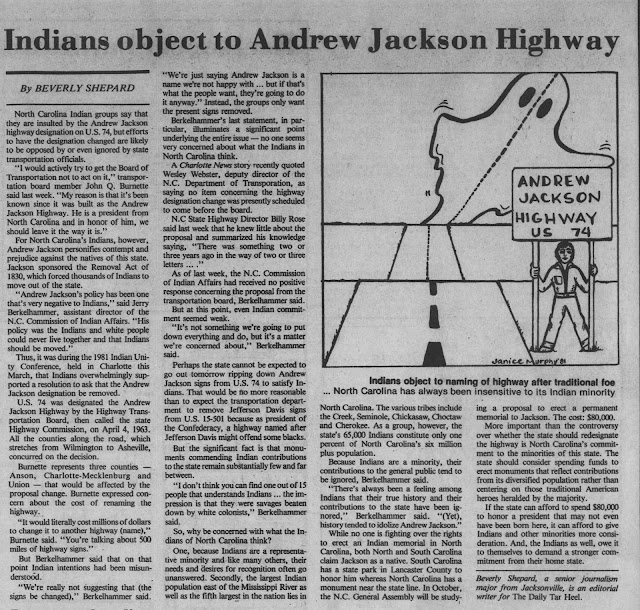1981 “There’s always been a feeling among Indians that their true history and their contributions to the state have been ignored,” Berkelhammer said, “(Yet), history tended to idolize Andrew Jackson.
Indians object to Andrew Jackson Highway
By Beverly Shepard
1981 Sep 9, The Daily Tar Heel
North Carolina Indian groups say that they are insulted by the Andrew Jackson highway designation on U.S. 74, but efforts to have the designation changed are likely to be opposed by or even ignored by state transportation officials.
“I would actively try to get the Board of Transportation not to act on it,” transportation board member John Q. Burnette said last week. “My reason is that it’s been known since it was built as the Andrew Jackson Highway. He is a president from North Carolina and in honor of him, we should leave it the way it is.”
For North Carolina Indians, however, Andrew Jackson personifies contempt and prejudice against the natives of this state. Jackson sponsored the Removal Act of 1830, which forced thousands of Indians to move out of the state.
“Andrew Jackson’s policy has been one that’s very negative to Indians,” said Jerry Berkelhammer, assistant director of the N.C. Commission of Indian Affairs. “His policy was the Indians and white people could never live together and that Indians should be moved.”
Thus, it was during the 1981 Indian Unity Conference, held in Charlotte this March that Indians overwhelmingly supported a resolution to ask that the Andrew Jackson designation be removed.
U.S. 74 was designated the Andrew Jackson Highway by the Highway Transportation Board, then called the state Highway Commission, on April 4, 1963. All the counties along the road, which stretches from Wilmington to Asheville, concurred on the decision.
Burnette represents three counties – Anson, Charlotte-Mecklenburg and Union – that would be affected by the proposal change. Burnette expressed concern about the cost of renaming the highway.
“It would literally cost missions of dollars to change it to another highway (name),” Burnette said. “You’re talking about 500 miles of highway signs.”
But Berkelhammer said that on that point Indian interntions had been misunderstood.
“We’re really not suggesting that (the signs be changed,” Berkelhammer said. “We’re just saying Andrew Jackson is a name we’re not happy with… but if that’s what the people want, they’re going to do it anyway.” Instead, the groups only want the present signs removed.
Berkelhammer’s last statement, in particular, illuminates a significant point underlying the entire issue – no one seems very concerned about what the Indians in North Carolina think.
A Charlotte News story recently quoted Wesley Webster, deputy director of the N.C. Department of Transportation, as saying no item concerning the highway designation change was presently scheduled to come before the board.
N.C. State Highway Director Billy Rose said last week that he knew little about the proposal and summarized his knowledge saying, “There was something two or three years ago in the way of two or three letters…”
As of last week, the N.C. Commission of Indian Affairs had received no positive response concerning the proposal from the transportation board, Berkelhammer said.
But at this point, even Indian commitment seemed weak.
“It’s not something we’re going to put down everything and do, but it’s a matter we’re concerned about,” Berkelhammer said.
Perhaps the state cannot be expected to go out tomorrow ripping down Andrew Jackson signs from U.S. 74 to satisfy Indians. That would be no more reasonable than to expect the transportation department to remove Jefferson Davis signs from U.S. 15-501, because as president of the Confederacy, a highway named after Jefferson Davis might offend some blacks.
But the significant fact is that monuments commending Indian contributions to the state remain substantially few and far between.
“I don’t think you can find one out of 15 people that understands Indians… the impression is that they were savages beaten down by white colonists,” Berkelhammer said.
So, why be concerned with what the Indians of North Carolina think?
One, because Indians are a representative minority and like many others, their needs and desires for recognition often go unanswered. Secondly, the largest Indian population east of the Mississippi River as well as the fifth largest in the nation lies in North Carolina. The various tribes include the Creek, Seminole, Chickasaw, Choctaw and Cherokee. As a group, however, the states 65,000 Indians constitute only one percent of North Carolina’s six million plus population.
Because Indians are a minority, their contributions to the general public tend to be ignored, Berkelhammer said.
“There’s always been a feeling among Indians that their true history and their contributions to the state have been ignored,” Berkelhammer said, “(Yet), history tended to idolize Andrew Jackson.
While no one is fighting over the rights to erect an Indian memorial in North Carolina, both North and South Carolina has a state park in Lancaster County to honor him whereas North Carolina has a monument near the state line. In October, the N.C. General Assembly will be studying a proposal to erect a permanent memorial to Jackson. The cost: $80,000.
More important than the controversy over whether the state should redesignate the highway is North Carolina’s commitment to the minorities of this state. The state should consider spending funds to erect monuments that reflect contributions from its diversified population rather than centering on those traditional American heroes heralded by the majority.
If the state can afford to spend $80,000 to honor a president that may not even have been born here, it can afford to give Indians and other minorities more consideration. And, the Indians as well, owe it to themselves to demand a stronger commitment from their home state.
 |
| 1981 Sep 9, The Daily Tar Heel |



Comments
Post a Comment